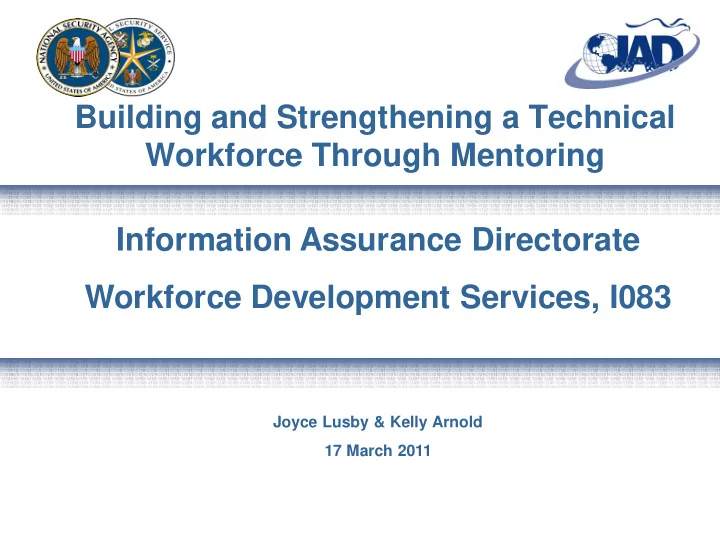

Building and Strengthening a Technical Workforce Through Mentoring Information Assurance Directorate Workforce Development Services, I083 Joyce Lusby & Kelly Arnold 17 March 2011
Purpose of Briefing • Provide Mentoring “Best Practices” from an Information Assurance Organization • Participate in an interactive professional networking experience (Speed Mentoring)
Why Mentoring? • Enhance technical and professional skills • Encourage professional development and career planning • Educate new employees about Agency policies, procedures and norms • Provide opportunity for feedback from objective resources • Assist with change management • Plan for future mission
Building A Mentoring Program • Support and Vision from leadership • Lead focus groups, surveys or interviews to solicit workforce requirements and employee needs. Ask them what they need! • Workforce populations to include: – New Hires – Mid Career – Senior – Technical – Non-Technical
Building A Mentoring Program • Form Steering Committee – Acquire representatives from relevant organizations to assist with: – Marketing the program; – Partnering within the organization; and – Facilitating events & activities • Training for All – Mentors & Mentees
Types of Mentoring Programs • Formal • Enhanced Informal • Informal • Mathematics in Education Partnership Program (MEPP) • New Hire Orientations • Reverse Mentoring
Technology/Social Networking • Interactive, collaborative technologies used to catalog mentors available and mentees seeking assistance • Searchable by organization and area of expertise • Public kudos • Rich content
Technology Features • Robust – can handle many users • Far Reaching – available at all your sites • Easy to Use - intuitive
Resources • Government Wide Conferences – Federal Mentoring Roundtable, 22 March 2011 – National Institute of Health/Natcher Conference Center – Bethesda, MD – Point-of-contact: James.Dean@nih.hhs.gov • Industry Mentoring Activities – International Mentoring Association http://mentoring-association.org/Confr.html • EBooks/Periodicals/Professional Groups/Networks with Mentoring
Tips/Suggestions • Focus on sustainability • Do not recommend “Chain of Command” Mentors • Cost is low, but does require personal commitment and time • Rewards and recognition • Share your successes and lessons learned with others
Mentors & Mentees - Getting Started! • Assess your strengths/areas to improve and what you can give or take from a mentoring partnership • Explore – ask friends and co-workers about their experiences • Attend a mentoring event • Interview potential mentors or mentees to see where common goals exist • Select mentor that has a good fit; always optional to de-select; • Participate and benefit • Collect metrics
Speed Mentoring An interactive professional networking experience Like Speed Dating but you can do this at work • Brief introduction of session, logistics, norms & rules • Mentors interact with mentees for ~10 minutes & then move to next mentee sequentially • Works best with small cohorts/groups • Event length - usually 2 hours to accommodate interaction • Framing questions provided to lead the discussion • Follow-up /feedback requested from participants • Held on a quarterly basis or as needed by your workforce
Framing Questions • What are your requirements for a mentor? • What are your strengths/which areas do you want to improve? • What are you most interested in gaining from a mentoring partnership? (career development, strategic advisement, political savvy, training and certification assistance, and/or navigating throughout the workforce)
Processing The Activity • Benchmarks – Collect Feedback from Mentees and Mentors – Consider Lessons Learned – Make Changes as requested by your workforce • Cumulative Impacts – Identify points-of-contact for areas of expertise – Explore job opportunities – Assist and answer follow-up requests after events – Facilitate Mentoring Partnerships
Questions? Joyce Lusby & Kelly Arnold j.lusby@radium.ncsc.mil kaarnol@nsa.gov 410-854-5676
Recommend
More recommend